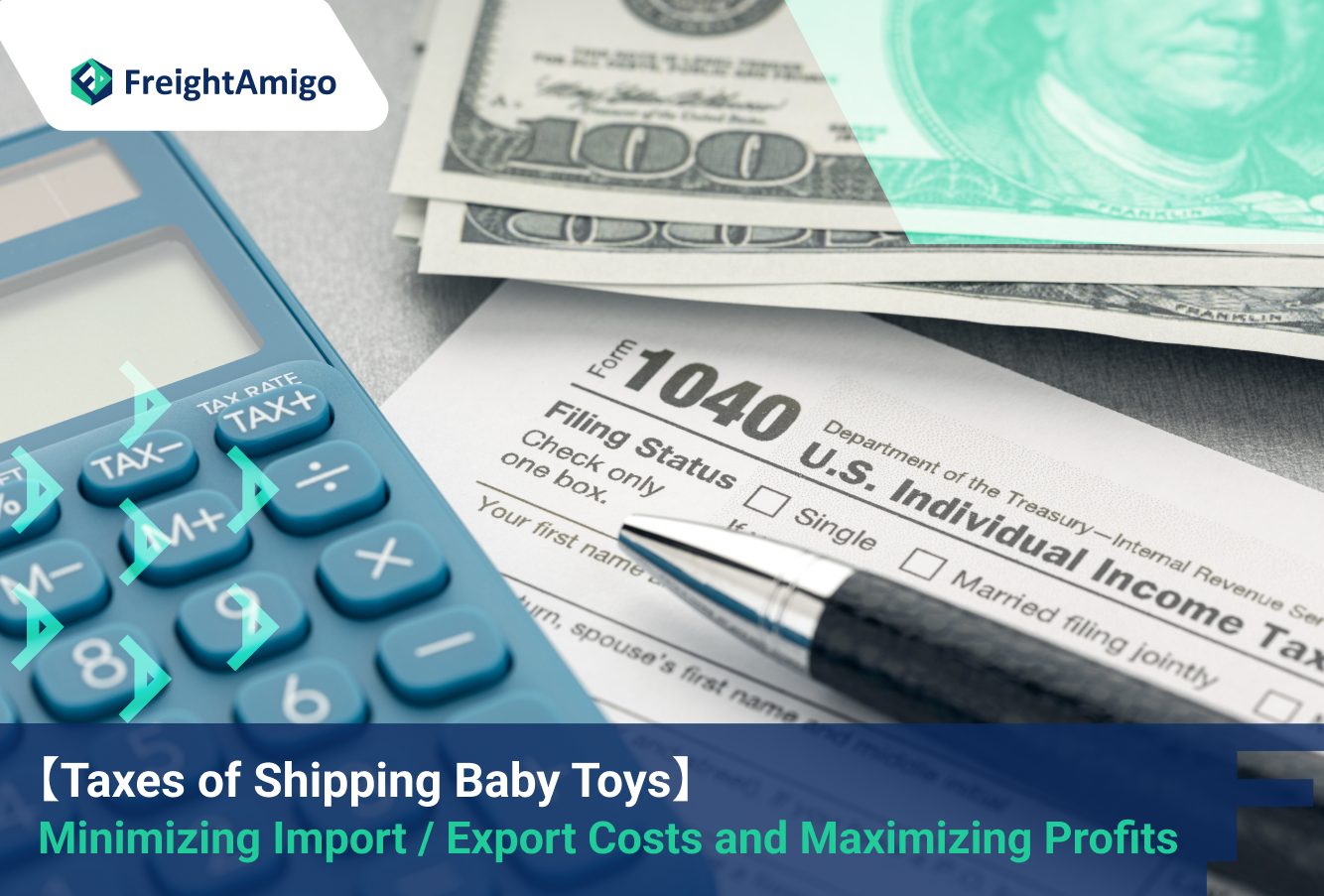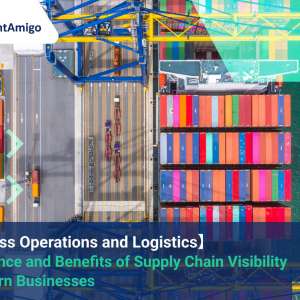Importing and exporting baby toys can be a profitable business. The market for unique and high-quality toys is growing, providing entrepreneurs with an opportunity to tap into a thriving industry. To minimize costs and maximize profits, it’s crucial to understand the tax implications of shipping baby toys.
When importing and exporting baby toys, consider several factors. This article will guide you through the essential steps to succeed in the baby toy industry. It covers understanding common taxes and duties, navigating customs regulations, and more.
Latest update on 26 February, 2024 by Aiden Ng– Marketing Analyst at FreightAmigo
Want to compare the best Express, Air Freight, Sea Freight, Rail Freight & Trucking rates so as to have better control on cost?
Understanding the Tax Implications of Shipping Baby Toys
Shipping baby toys internationally involves dealing with various taxes and duties. These charges can significantly impact your overall costs and profits.
It’s crucial to have a clear understanding of the tax implications to avoid any surprises and plan your business strategy accordingly. One of the primary taxes associated with shipping baby toys is import duty, which is a tax levied by the country where the toys are being shipped to. Import duty rates vary based on factors such as the type of toy, its value, and the country of origin. To accurately calculate costs, it is important to research and understand the import duty rates of your target markets.
Additionally, you may encounter Value Added Tax (VAT) or Goods and Services Tax (GST), which are typically calculated based on the value of the toys and applied at the point of sale or import. It is essential to understand the VAT or GST rates of different countries when planning your pricing and profit margins.
Common Taxes and Duties on Baby Toy Imports and Exports
When importing or exporting baby toys, it is essential to be familiar with the common taxes and duties that may apply. Understanding these charges will help you plan your budget and pricing strategy to ensure maximum profitability.
- Import duty is a tax imposed on goods entering a country. The rate of import duty varies depending on the type of toy and the country of origin. Researching the import duty rates of your target markets is crucial for accurately calculating your costs.
- Value Added Tax (VAT) or Goods and Services Tax (GST) is a tax levied on the value of goods or services. These taxes are usually applied at the point of sale or import. It is essential to understand the VAT or GST rates of your target markets to avoid any surprises and plan your pricing strategy accordingly.
- Additionally, it is important to consider custom clearance fees. When importing or exporting baby toys, you may also incur custom clearance fees. These fees cover the administrative costs associated with processing and inspecting the goods at the border. It is important to factor these fees into your overall costs to avoid any unexpected expenses.
By familiarising yourself with these common taxes and duties, you can better plan and budget for your baby toy business, ensuring maximum profitability.
How to Minimize Import / Export Costs for Baby Toys
To maximize profits in the baby toy industry, it is crucial to minimize import/export costs. Effective strategies can help reduce expenses and increase the bottom line. Here are some tips to minimize import/export costs for baby toys:
- Research and compare shipping options. It is essential to research and compare different shipping options when shipping baby toys internationally. Look for reliable carriers that offer competitive rates and efficient delivery times. To minimize transportation costs, find the most cost-effective shipping solution.
- Optimize your packaging by reducing unnecessary weight and size of your baby toys. Consider using lightweight materials and efficient packaging techniques while ensuring the safety and protection of the toys.
- Also, consolidate shipments. Consider consolidating multiple shipments into one if you frequently import or export baby toys. This can help you benefit from economies of scale and negotiate better shipping rates, significantly reducing transportation costs and increasing overall profitability.
Implementing these strategies can minimize import/export costs and increase profits in the baby toy industry.
Strategies for Maximizing Profits in the Baby Toy Industry
This will help you to minimize import/export costs and maximize your profits.
- To maximize profits in the baby toy industry, it is crucial to develop a unique product line that differentiates your baby toys from the competition. Conduct market research to identify gaps and trends in the industry. Offer innovative and exclusive toys to attract a loyal customer base and command higher prices.
- Establish strategic partnerships with manufacturers, distributors, and retailers to expand your reach, increase sales, and reduce marketing and distribution costs, leading to higher profits.
- Implement effective marketing strategies. Invest in effective marketing strategies to promote your baby toys. Use social media platforms, influencer marketing, and targeted advertising to reach your target audience. Creating a strong brand presence and generating buzz around your products can increase demand and command premium prices.
By implementing these strategies, you can maximize your profits and establish a strong presence in the competitive baby toy industry. Navigate customs regulations successfully to avoid delays, penalties, or even the seizure of your goods. To do this, thoroughly research the customs regulations of the specific country
Expert Advice on Tax Planning for Baby Toy Businesses
Tax planning is crucial for a successful baby toy business. Seeking expert advice can help you optimize your tax strategy and reduce costs. Here are some key considerations and expert tips for tax planning in the baby toy industry.
- It is recommended to consult with a tax professional who specializes in international trade and customs regulations. Valuable advice can be provided, tailored to your specific business needs, to help you navigate the complex tax landscape.
- It is recommended that you research and identify any tax incentives or exemptions that may be available for your baby toy business. Some countries offer tax breaks for businesses in specific industries or for exporting goods. By taking advantage of these incentives, you can reduce your tax burden and increase your profitability.
- It is important to stay updated on tax regulations. It is important to stay updated on the latest tax regulations and developments. You can do this by subscribing to industry newsletters, attending trade conferences, and networking with other professionals. This will help you make informed decisions and adapt your tax strategy accordingly.
By seeking expert advice and being proactive in your tax planning, you can optimise your tax strategy and minimise costs in the baby toy industry.
Conclusion: Key takeaways for minimizing costs and maximizing profits in the baby toy industry
Importing and exporting baby toys can be profitable. It is important to understand tax implications and implement effective strategies to minimize costs and maximize profits. Research and understand common taxes and duties, minimize import/export costs, and implement strategies for maximizing profitability to establish a successful baby toy business.
To ensure compliance and optimize your tax strategy, it is crucial to navigate customs regulations and seek expert advice. By following these key takeaways, you can minimize costs, maximize profits, and thrive in the competitive baby toy industry.
Success in this industry requires careful planning, continuous learning, and adaptability. It is important to stay informed, innovate, and always prioritize the safety and quality of the toys you import or export. Your baby toy business can flourish with the right strategies and a passion for delivering joy to children.
To ensure the most cost effective shipping experience for your baby toys, it is best to have the full support of logistics experts! If you are planning to ship baby toys overseas, please visit the FreightAmigo page for enquiries.
Read More:
【How to Ship Nursery Furniture】A Step-by-Step Guide
【How to Ship Baby Clothes 】Expert Tips to Ensure Safe and Timely Delivery
【Regulations of Shipping Children’s Foods】Guaranteeing Regulatory Compliance and Safety
Moving Overseas – What must you know about relocation? Submit a quotation & enjoy 3% OFF now!
If you have any inquiries on logistics/supply chain, feel free to contact FreightAmigo now:
Chat with us online | Hotline: +852 28121686 | WhatsApp: +852 27467829



